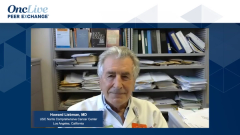
Novel Treatment Strategies in Immune Thrombocytopenia: Frontline Use of TPO-RAs
Shared insight on clinical trials investigating the frontline use of thrombopoietin receptor agonists in patients with immune thrombocytopenia.
Episodes in this series

Transcript:
Morey Blinder, MD: For the sake of time, I think what we should end with is discussing the unmet needs and some of the emerging treatment strategies for ITP [immune thrombocytopenia]. Let’s talk about some of the newer approaches that are just ongoing. We’ve talked a little bit about a couple of them, it’s come up like the BTK [Bruton tyrosine kinase] inhibitors and some of the monoclonal antibodies that are available. Maybe let’s start where we’ve left off with just talking about TPO [thrombopoietin] receptor agonists. There have been several abstracts looking at the oral thrombopoietin receptor agonist as starting upfront therapy. Do you have any thoughts or experience about this in the adult population starting early or even upfront with the TPO receptor agonist? I’ll start with Danny again.
Daniel Landau, MD: Yeah. At least from the abstracts that I’m aware of, it does seem to be an efficacious approach to start with the TPO receptor agonist as early as possible. I am a believer in trying to limit high-dose steroid exposure as best we can. I’m hoping that this is going to be the wave of the future.
Morey Blinder, MD: I think that’s a fair point. I think one of the advantages early on, more than a decade ago to the TPO receptor agonists, is I think they really cut down on the long-term use of steroids. In my career, that was one of the bigger impacts of the TPO receptor agonists was the need for people to be on months and months of steroids. Maybe using them upfront is another way or very early way to approach that. Howard, any thoughts about TPO receptor agonist as upfront therapy?
Howard Liebman, MD: First, I have to agree with you. That was a salvation these drugs to get people off of steroids. We recently reviewed Adam Cuker, [MD, Hospital of the University of Pennsylvania,] and I did a review of the long-term effects of corticosteroids and ITP from the literature. I can tell you that to get them off is worthwhile, but I think, and it was brought up, the friendship took the lead in a meeting that was in Switzerland in 2019, the [ICIS ITP Experts] Meeting. The head of the autoimmune center in France said that they are really moving TPO agonists, and they prefer eltrombopag. I think that’s their drug of choice by far. Early on, they find that they get patients who respond faster. They don’t have a lot of these patients getting multiple courses of IVIG [intravenous Immunoglobulin] and long-term steroids and get them out of the hospital faster. He thinks that the outcomes may be better in terms of using this and getting them off steroids earlier because there’s still no proof that if you extend steroids long-term, all you’re going to do is just make toxicity. Why do you have to keep them on even up to 6 weeks? Why not 2 weeks, or just a week or so? I think that’s 1 of the data. And we use it earlier.
In-house we’ll use romiplostim. It is approved now to use it down to 3 months. Although I think using it earlier in patients who come in with severe ITP and don’t seem to be responding to IVIG and steroids, we don’t often admit patients. Only those groups that really are very, very low and have lean mass stations. And so, we added on earlier. I think there’s a role for using it earlier. I think we should start doing some trials to get the FDA to say, yeah, let’s do it literally on our admission along with our steroids and our IVIG.
Cindy Neunert, MD: Howard, I was going to ask about this when you were talking about this treatment-free response data that’s coming out. There probably is some benefit to early exposure enhancing that. Then perhaps, as we’ve learned from other things, having immune modulation in the background while you’re simultaneously doing that would really maybe shift not even from getting people off steroids, but from reducing the number of persistent and chronic patients. That would also be the other ideal if we can, with that combination of upfront immune therapy, get those steroids on, and then also try to come from the other side at the same time very early on to see if you can just reset that immune.
Howard Liebman, MD: I agree with you completely because obviously, I don’t probably treat some hemophilia patients and if they have inhibitors, we used to use immune suppression and factor, but now you just use factor, lots of factor to see a lot of factor rate and you get the remissions. In fact, who knows whether the immunosuppression is inhibiting the develop of a new tolerance? Again, I get them off steroids early and get their platelet up, and they may again acquire long-term remission. It’s probably even more so in the younger patients, I think than the older patients unless they have a significant underlying immune defect. Something in central of peripheral immune tolerance. I think in those patients you get remissions that way.
Morey Blinder, MD: I think that’s an interesting point. Yes, go ahead, Cindy.
Cindy Neunert, MD: I was going to say we have an open clinical trial right now in pediatrics using avatrombopag in newly diagnosed patients who have either failed or just are starting. It’s hard for us in pediatrics to ever try to show that we’re reducing chronicity because our chronicity rates are so low. Although we are going to be looking at T-reg [T-regulatory cell] profiles and other things to see if there is anything that we can learn mechanistically to give some more evidence to the notion that this is a viable way to look at things.
Transcript edited for clarity.











































